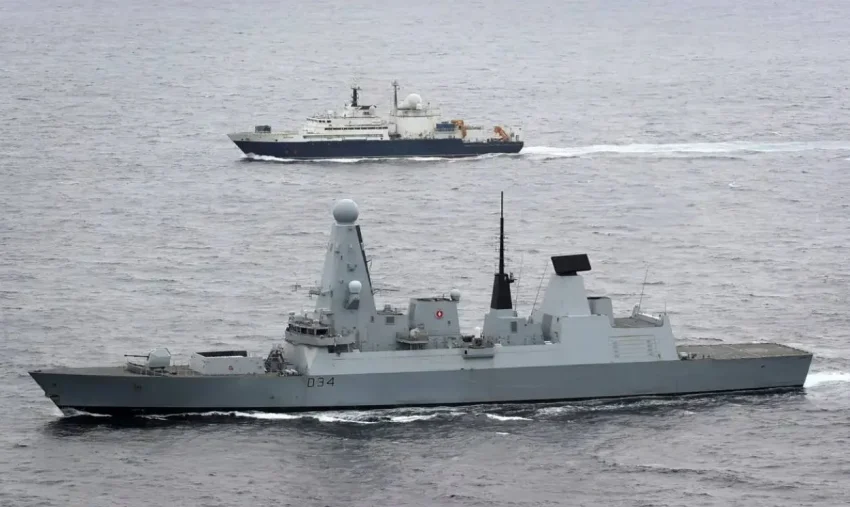A British Royal Navy destroyer escorts the spy ship in the Irish Sea last Friday
Russian sabotage submarines have been attacking internet cables in the Baltic, cutting one line that runs from Sweden to Lithuania via the island of Gotland. Another more vital cable was cut that joins Hanko and Helsinki in Finland with Rostock in Germany, the C-Lion1.
At the same time in the Irish Sea, a Russian spy ship equipped with deep diving mini-subs, has been escorted away after spending an undue amount of time hanging around major cables that connect Irish data centers to the UK mainland.
The same ship often hangs over key junction points off Northern Ireland where trans-Atlantic cables meet.
This follows events in 2023 where a Russian ship dragged up the Shetland Islands-UK cable and broke it, and where a Chinese owned Russian crewed ship deliberately dragged its anchor through the cable connecting Finland and Estonia in the Gulf of Bothnia.
Russia abilities to do this kind of damage is surprisingly large. It has surface ships that do little else but spy in cables and have the capacity to cut them. It has one vast Submarine, the Belgorod, that is so big it carries a smaller but sizeable deep diving submarine in its under-hull dock.
The Belgorod now in service
The history of cable snooping goes way back, and has had moments in history. During the Korean 007 airliner incident American listening gear attached to a Russian coms cable that ran from Vladivostok to Petropavlovsk Kamchatka proved it was indeed, a deliberate shooting down.
These days it’s far more complicated with 85% of internet traffic carried by fiber optic cables around the world and under the sea.
It’s not just internet cables. The Russians are known to have mapped out the connection lines in the North Sea for the many wind turbines, as well as gas rig pipes.
German Defense Minister Boris Pistorius laid the blame where we all think it should be.
The internet cables and pipeline security issue has become a big issue as the vulnerability has become clear, largely because Russia has made itself so obvious in they way its ships and submarines behave.
Once a singularly national concern, all of Europe, both as EU (whose commerce is affected) and NATO, are taking the matter far more seriously than they ever did. NATO is seeing it as another aspect of its protective mission.
France, the UK, Germany and Holland are all looking at adding cable protection roles to some of their ships, which include deep water drones and early warning systems. Russia seems to have gone about its business so aggressively that yet again it’s woken up otherwise sleeping national security interests.
What’s the purpose of the attacks? Disruption and inconvenience at present. The UK has removed at least one spyware unit from one cable but kept it very quiet. There’s bound to be more simply based on the amount of Russian activity that’s been detected above the cables.
Be in no doubt, there’s no internet without these cables. Cutting one is an inconvenience but a wholesale attack on a wide spectrum of cables under the Atlantic, near the various nodes where they come ashore is quite another.
Can we retaliate? Not like for like, no. 95% of Russian cables are on land – it’s just the geography of the country that makes it that way.
